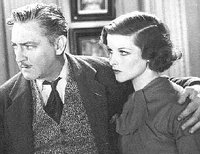 Today, I watched A Bill of Divorcement (1932) for the first time, knowing it was Hepburn’s first role. You can see what Cukor saw in the young actress: her long, lithe, angular form and her confident, controlled acting. She handled both the arrogance of youth and the trauma of tragedy well in this melodrama. But I so did not know or expect the plot. [spoiler warning!!]
Today, I watched A Bill of Divorcement (1932) for the first time, knowing it was Hepburn’s first role. You can see what Cukor saw in the young actress: her long, lithe, angular form and her confident, controlled acting. She handled both the arrogance of youth and the trauma of tragedy well in this melodrama. But I so did not know or expect the plot. [spoiler warning!!]Perhaps linking it in my mind with her next films, Morning Glory and Christopher Strong (both 1933), I thought the plot was something about a young woman who fell in love with a married man and insisted he divorce, hence the title. Instead, I got a melodrama with John Barrymore (that superb thespian's thespian) and Billie Burke (voice always aquiver but admirably restrained, given the character). At the heart of the film is the impact of mental illness on a family, as Barrymore’s Hilary Fairfield returns to his family after 15+ years in a mental institution. Shell shock, the film argues, triggered a genetic predisposition to some form of delusional schizophrenia, and after 15 years, wife Meg (Burke) gets a divorce so she can move on with her life, can marry her lawyer, Gray Meredith (Paul Cavanagh), a warm yet patriarchal type. When the veil lifts one day, Hilary heads home and is devastated to find he has lost so many years and no longer fits into his home or wife’s life. He is at turns sad and abusive, pensive and calm. Barrymore is over the top at times, but such is the role. Wonderful is his daughter, Sidney, played by Hepburn: a girl on the verge of adulthood and marriage, confident and optimistic, yet soon brought down by her father’s pain and her knowledge that it is her “place” to care for him. She never knew her father, yet she is immediately drawn to him and to caring for him. Knowing the insanity is genetic, Sidney opts to break off her engagement with handsome and loving young Kit Humphreys (David Manners). (One of Hilary’s sisters, we are told, was also institutionalized for a time; his other sister, Hester (Elizabeth Patterson), is a determined spinster—in every sexist sense of the word.) Hepburn is at her heart-breaking best as Sidney marshals her strength and ends the relationship, knowing she and Kit can never have children and, worse, she might herself become mentally unstable and force Kit to suffer for years as her mother did.
What surprised me most about the film was where it ended. Melodramatic excess was everywhere, but I fully expected the unstable and
 childishly clinging yet also generous and wise Hilary to let his daughter go, as he did with his wife. Though he suffered for it, he did let Meg go, realizing that he did not truly know her anymore—if he ever did—and she deserved a life of love and happiness without him. Yet, when Kit returns one last time to whistle at the window (as the lovers romantically did early in the film) to see if Sidney will marry and go away with him, she closes the curtains and sits down with her father at the piano as the two play Hilary’s unfinished sonata (begun before his illness) with increasing (hysterical) gaiety. Fade to black.
childishly clinging yet also generous and wise Hilary to let his daughter go, as he did with his wife. Though he suffered for it, he did let Meg go, realizing that he did not truly know her anymore—if he ever did—and she deserved a life of love and happiness without him. Yet, when Kit returns one last time to whistle at the window (as the lovers romantically did early in the film) to see if Sidney will marry and go away with him, she closes the curtains and sits down with her father at the piano as the two play Hilary’s unfinished sonata (begun before his illness) with increasing (hysterical) gaiety. Fade to black.It is a tidy film, neatly directed by Cukor, who can sometimes sacrifice cohesiveness for the sake of particular scenes or actors. But I’m astonished by this ending. Shall I read it as a tragedy? Hilary Fairfield is too emotionally unstable to do the right thing for his daughter, even if he could do it for his wife? Sidney is a generous soul who takes over her mother’s burden so the middle-aged woman (who married a soldier she did not love because that is just how things were at wartime) can at last have a few year’s happiness? Those with mental illness in the genes truly shouldn’t have children or even marry? (How popular a scientific thesis was inherited mental illness at this time?) Is the film simply about how well melodrama sells, regardless of specifics? Or perhaps a larger subject is being considered here: Is the film perhaps about a culture wrestling with the subject of divorce? Is it a study in masculinity-in-crisis?
Ultimately, I’m not sure what the film is arguing through its ending, but I know I feel trapped by it. Particularly remarkable is that the young daughter is trapped before even achieving adult independence while the mother, the older generation, is freed. Perhaps not only masculinity in some abstract sense is challenged here but also the price paid by succeeding generations for the wars and marriage traditions of their fathers (and mothers). If something does not change, the film might be said to argue, the ills of the older generation will destroy the younger? All I can say for certain is that I would not be contemplating these larger (political) themes if our heroine simply married her young man and they went off into the sunset together.


No comments:
Post a Comment